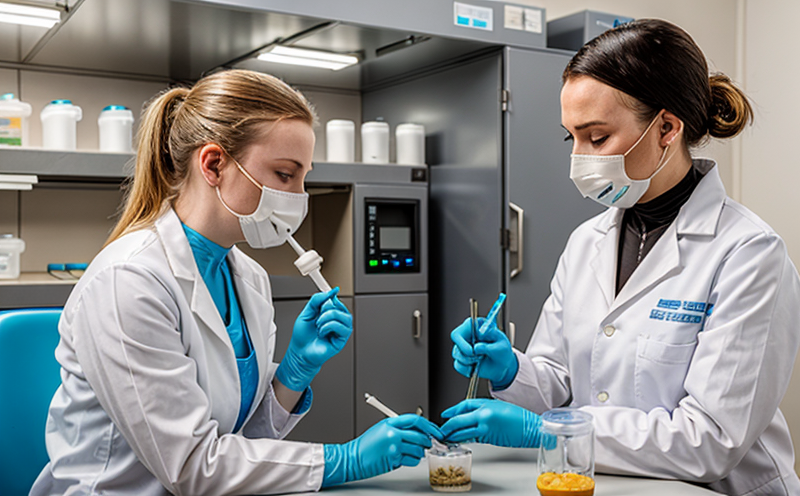EN 18122 Fumonisin Residue Testing in Corn Snacks
The European standard EN 18122 specifies methods and criteria for determining fumonisin residues in corn snacks. This service ensures that products comply with the stringent requirements set forth by this regulation, which aims to protect public health from the adverse effects of these mycotoxins. Fumonisins are toxic compounds produced by certain molds (such as Aspergillus niger and Fusarium) that can grow on corn during storage or processing.
Corn snacks, a popular snack food worldwide, pose a significant risk due to their high moisture content and potential for mold contamination. Compliance with EN 18122 is essential for manufacturers to avoid legal repercussions, maintain brand integrity, and ensure consumer safety. The standard outlines the correct sampling procedures, analytical methods, and acceptable limits of fumonisin residues in corn snacks.
The testing process involves several critical steps. Initially, a representative sample must be collected from the production line or batch. This sample should reflect the variability within the product to provide accurate results. After collection, samples are preserved under controlled conditions until they can undergo analysis. The chosen method for fumonisin detection is liquid chromatography with tandem mass spectrometry (LC-MS/MS), which offers high sensitivity and specificity.
Preparation of the sample includes extraction using a suitable solvent to dissolve any bound mycotoxins. This step ensures that all fumonisins are available for quantification. Following extraction, clean-up procedures may be necessary to remove interfering substances before injection into the LC-MS/MS instrument. The chromatographic separation and detection process is highly automated, allowing accurate quantitation of fumonisin levels.
The acceptance criteria specified in EN 18122 define the maximum allowable concentration of fumonisins in corn snacks as 1, B2, and B3). Compliance with these limits ensures that products meet regulatory standards. Failure to adhere could lead to product recalls, loss of market share, and potential legal actions.
In addition to compliance testing, this service can be used by R&D teams to optimize production processes and minimize fumonisin contamination. By understanding the sources of contamination and implementing preventive measures, manufacturers can enhance product quality and safety.
- Representative sampling
- Solvent extraction for mycotoxin removal
- Clean-up procedures before injection into LC-MS/MS
- Automated chromatography and tandem mass spectrometry analysis
- Compliance with EN 18122 limits on total fumonisins in corn snacks
The importance of this testing cannot be overstated. Fumonisins have been linked to various health issues, including liver damage, cancer, and neurotoxic effects. Ensuring that these compounds do not exceed safe levels is crucial for maintaining public trust and regulatory compliance.
Benefits
Compliance with EN 18122 offers numerous benefits to manufacturers of corn snacks:
- Avoids legal issues: Ensures that products meet all relevant regulations, reducing the risk of fines and product recalls.
- Enhances brand reputation: Demonstrates a commitment to quality and safety, which can improve consumer trust and loyalty.
- Promotes market access: Compliance with international standards opens doors to export markets that require strict fumonisin limits.
- Supports product innovation: Insights gained from testing can lead to improvements in production processes and ingredient selection.
By integrating this service into their quality control protocols, companies not only meet regulatory requirements but also position themselves as leaders in food safety and consumer health. This proactive approach helps maintain a competitive edge in the marketplace.
Quality and Reliability Assurance
The quality and reliability of our EN 18122 testing services are ensured through rigorous calibration procedures and adherence to international standards. Our laboratory is equipped with state-of-the-art LC-MS/MS instruments, which provide precise and accurate results.
- Calibration using certified reference materials
- Rigorous quality control measures during sample preparation and analysis
- Regular validation of analytical methods against international standards (ISO, EN, IEC)
We also employ highly trained and certified analysts who are experts in food safety testing. They follow strict protocols to ensure consistent and reliable results.
Our commitment to quality is further demonstrated by our accreditation with ISO/IEC 17025, ensuring that we meet the highest standards of proficiency. This accreditation guarantees that our methods, instrumentation, and personnel are capable of producing accurate and repeatable test results.
Competitive Advantage and Market Impact
By offering EN 18122 fumonisin residue testing in corn snacks, we provide manufacturers with a competitive edge. Compliance with this standard not only ensures safety but also enhances brand reputation and market access.
Consumers increasingly prioritize health and safety when selecting products. By demonstrating adherence to rigorous international standards, companies can build trust and loyalty among consumers. This transparency can lead to increased sales and customer retention.
In the global market, compliance with European standards opens doors to export markets that require strict fumonisin limits. This service helps manufacturers penetrate new markets while maintaining their existing ones. The ability to consistently meet these standards positions companies as leaders in food safety and consumer health.
Moreover, this service supports product innovation by providing insights into potential sources of contamination. By addressing these issues early in the development process, manufacturers can enhance product quality and safety, ultimately leading to a competitive advantage.





